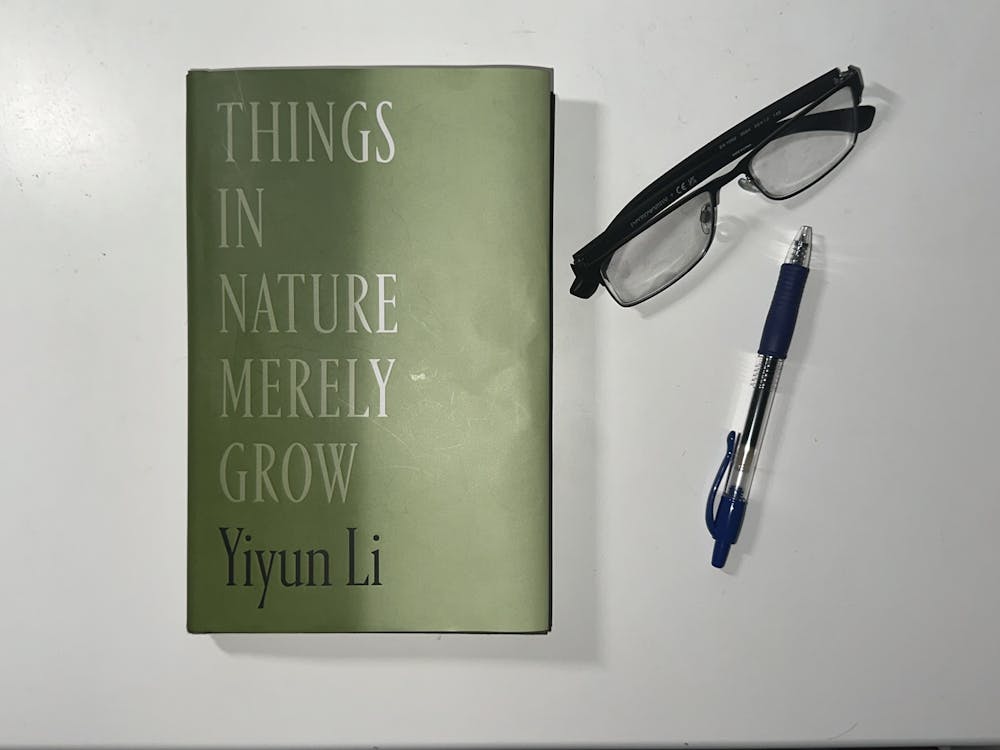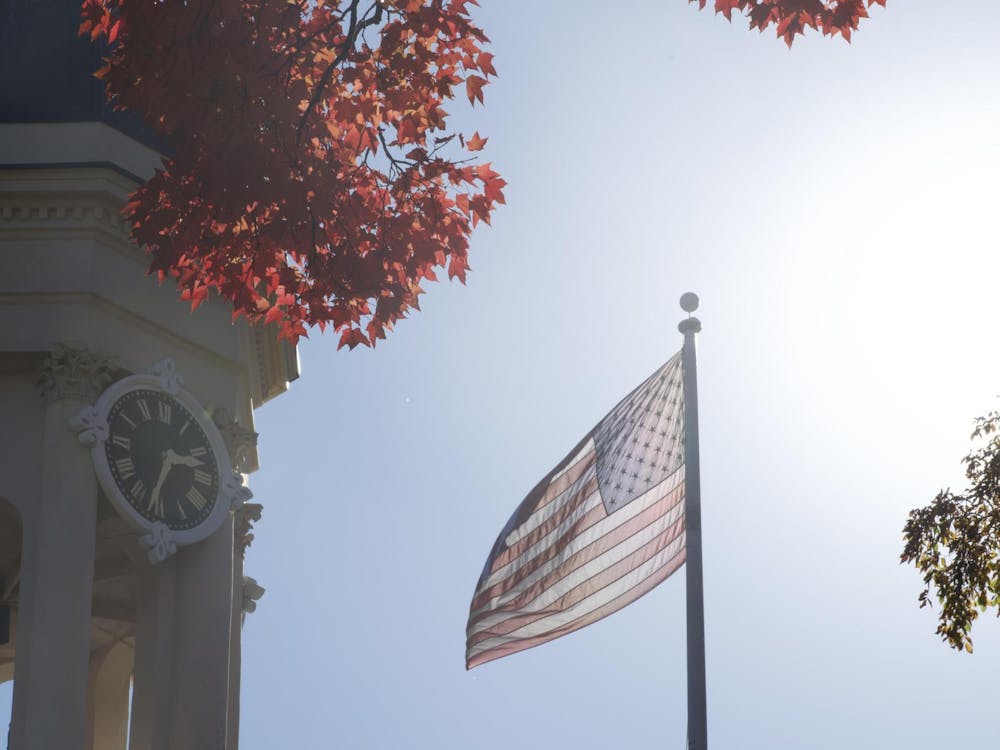Yiyun Li’s latest memoir, “Things in Nature Merely Grow,” begins with a careful analysis of a sentence often used to deliver news of death: “There is no good way to say this.” Li writes that these words, which police have delivered to her on two separate occasions, once after each of her sons died by suicide, border on cliché. Yet they are precise. Li’s characteristic insistence on describing reality with precision, no matter how painful, is evident from the first chapter. She even rails against oft-used words like grief and mourning, which she believes imply an end to the pain of loss. For her, the pain will never end. This new work is not catharsis, but a reminder that life will never be all right again.
Li, the Robert F. Goheen Professor in the Humanities, wrote the memoir in the year after her younger son, James, died by suicide as a first-year at Princeton, and is publishing it eight years after her older son, Vincent, died by suicide as a sophomore at Princeton High School. The book has been well-received by critics and is a finalist for the nonfiction category in this year’s National Book Awards.
Even before I read it, the book held a special interest for me: I was James’s classmate in high school, where we were both on the fencing team. I wasn’t a close friend but knew many who were. When I interviewed many of them last year for James’ obituary in our pages, they all talked about his kindness and reliability and humor, but they also talked about how quiet and enigmatic he was. The portrait of James we created always felt incomplete, so part of me wondered if reading this book could help me understand a person so mysterious in life.
Yet Li, too, often found James enigmatic in life. She writes about how Vincent, her older son, was flamboyant and captured people’s attention; James, on the other hand, turned away from notice. Much of James is explained in relation to his older brother, as if he remains too elusive to be defined independently. “Vincent lived feelingly, James lived thinkingly,” she writes. Li dreaded Vincent’s suicide long before it happened, but James’ choice stunned her. Earlier parts of the book are dominated by descriptions of Vincent, which initially surprised me — but an attempt to understand James is impossible without understanding others around him, she writes. This is particularly true of his brother, who may have been the only person to truly understand James, despite their differences.
In death, James remains enigmatic — Li acknowledges throughout the book that writing in a way that is true to who James was is no easy task, and both her answers and her questions may miss the truth.
Li explains early on that she tried to orient this book not around feelings, but logic, reflecting James’s personality. In this, she succeeds — the close analysis gives rise to a philosophy of life fractured by deaths, a topography of loss. Li writes from an “abyss,” or what a friend of hers describes as a “space outside place.” This abyss, this place she is unable to remove herself from, is a radical acceptance — no denials, few what-ifs — of the fact that her life will never again be all right. Death is like a point in a timeline, while the sorrow in life after death has no endpoint.
It’s ideas like these that make the book different from many other works on loss, and it’s also what may make the book difficult to process for readers who believe there is no logic after loss. But for readers who can suspend judgement and allow themselves to be swept away by Li’s writing, this book is well-worth the read.
The structure of the work, however, is where Li’s ability as a writer shines. Her sentences can travel a few minutes or several years in the same paragraph. Motifs and ideas are always consequential, and Li bends phrases to create surprising meanings. “To philosophize is to learn to die,” from Montaigne, temporarily becomes, “to philosophize is to learn to live with deaths.” Reality and unreality, life and death, mother and son, are pairs described as two hands placed close to each other, with fingers just touching or intertwined.

Parents can hold their children’s hands through some of life, but Li recognizes that parents cannot protect their children from everything. Even though she is a better mother than her mother, and her husband a better father than his own, both of her children chose — and she is particular about this word — to exit the world. “Both my children chose a hard thing. We are left with the hardest: to live after their deaths.” What is to be done in the face of helplessness? How do parents live after their children die? There are some answers: for instance, Li recounts how she chose to “do things that work,” an idea she remembered from psychologist Marsha Linehan. Yet most of the answers are hard to find, and the questions harder to ask.
Despite the serious and sad questions the book tackles, the slim volume — just 172 pages — is largely absent of melodrama. Li’s prose in this memoir, as in her fiction, is precise and sharp. Adjectives and adverbs are used sparingly. Short sentences are stark and painful. “Thinking about my children is like air, like time. Thinking about them will only end when I reach the end of my life.”
But there are some moments that brought up strong emotions in me; I felt disbelief at the callousness of strangers and ex-friends. Li details how one writer used the news of James’s death as an opportunity to introduce himself and ask for referrals to a publisher. In these moments, Li’s writing can border on darkly funny. (She directly addresses a parent who tries to impress her with the gesture of his daughter’s violin-playing: “I am a bereaved mother who happens to teach at an Ivy League university; I don’t work for the admissions office.”)
This work lingers less on the “why” of the deaths of her two children, although in a few instances, Li writes about the what-ifs, the what-could-have-beens. Each time, however, she catches herself and edits — or, to use a word she prefers, pressures — her thoughts to display rigor and respect for language and narrative. Alternatives, she writes, are fiction.

Other than a correction of her own thoughts, it seems that she is also admonishing members of the public who read more into her son’s deaths than anyone can understand — she dedicates several pages to American and Chinese newspapers and tabloids who were all too happy to revel in her tragedy.
Nowhere is this caution against interpretation clearer than in the title, which comes from a phrase Li thinks of when she gardens, a hobby she began a few years ago. Things in nature have no “metaphorical or symbolic meaning beyond nature's mere way of being.” Things in nature live, and they die. And those of us who lose will continue living, until we die as well.
Christopher Bao is a senior News writer for the ‘Prince.’ He is from Princeton, N.J. and typically covers town politics and life.
Please send any corrections to corrections@dailyprincetonian.com.








